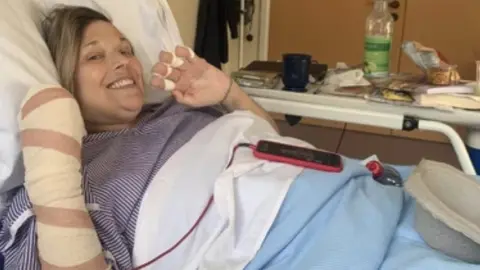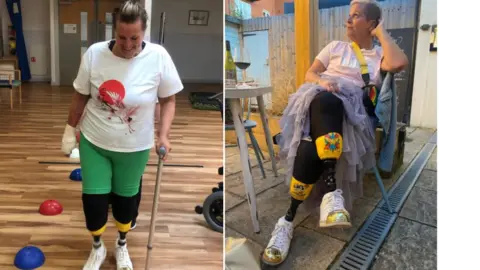Sepsis victim warns of silent symptoms after losing both legs
 Beth Budgen
Beth BudgenA woman who was in seemingly good health has described how a hard-to-detect case of sepsis resulted in her having both legs amputated.
Beth Budgen, from Newbury in Berkshire, thought she just had a cold when she woke up feeling ill on Christmas Eve.
But she started developing agonising pain the next day, vomited blue liquid and was rushed to A&E in Basingstoke.
The 46-year-old spent seven months in hospital but is now back at home trying to adapt to her new way of life.
 Beth Budgen
Beth BudgenWarning: This story contains a graphic image that some readers may find upsetting.
She told BBC Radio 5 Live she wanted to share her shocking story to raise awareness so others could spot the symptoms earlier.
A few hours after arriving at hospital, doctors told her family to "prepare for the worst" as she was put into an induced coma for six weeks.
"It think it all kind of happened pretty quickly from there... by Boxing Day I had a complete organ failure," she said.
Ms Budgen was not responding to life support and medics soon established that - as well as flu and pneumonia - she had contracted the strep A bacterial infection that ultimately led to sepsis.
 Beth Budgen
Beth BudgenWhen she came out of the coma her feet were black and doctors told her she had to have both legs amputated.
"I can't honestly tell you how that felt," she said.
"I think I was just so utterly shocked by it."
She underwent surgery at Southampton General Hospital, where she also had parts of her hands removed.
"It's surreal. At first everything is bandaged... you can see everything is shorter but you can't really see what they look like," she said.
 Beth Budgen
Beth BudgenIt was only when the bandages were taken off that reality sunk in.
But Ms Budgen said she considered herself lucky and has "always been an optimistic person".
Returning home after the amputation, however, has presented her with difficult challenges.
"First night I was here on my own in my own house I made the mistake of leaving my medication downstairs, so having made the 30-minute trip getting upstairs I realised I didn't have my medication - and that was my first meltdown," she said.
"I am pretty determined to wear my [prosthetic] legs as much as I can. It's just exhausting."

What is sepsis?
- Sepsis is known as the "hidden killer" because it can be so hard to detect.
- It is caused by the immune system going into overdrive. Instead of just fighting an infection, it starts attacking other parts of the body too.
- Ultimately it causes organ failure. Even survivors can be left with long-term damage and disability.
- Bacteria and viruses that cause diarrhoeal infections or lung diseases are the leading triggers of sepsis.
- The symptoms include: loss of consciousness, severe breathlessness, a high temperature, slurred speech, nausea and vomiting, diarrhoea, severe muscle pain.

"If this happened to me it can happen to anyone that you love," Ms Budgen said.
"People really need to be aware of the signs of sepsis and educate themselves."
Ms Budgen's family has launched a campaign to help her raise money for everything else she will need, from various adaptions to her home to a bespoke pair of legs.

Follow BBC South on Facebook, Twitter, or Instagram. Send your story ideas to [email protected].
